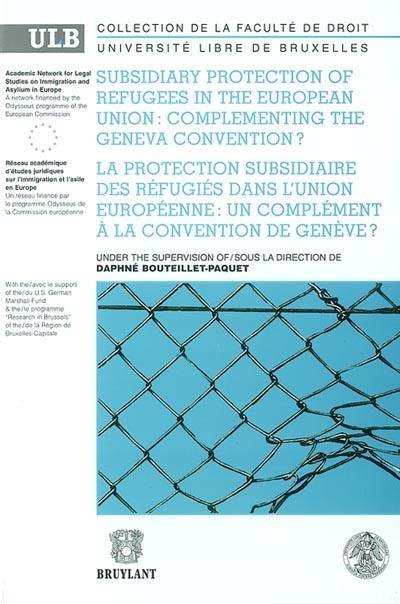
Fiche technique
Format : Broché
Nb de pages : XXIV-883 pages
Poids : 1415 g
Dimensions : 17cm X 25cm
EAN : 9782802715924
Subsidiary protection of refugees in the European Union
complementing the Geneva convention ?
Quatrième de couverture
Following the coverage of the regularisation of illegal aliens, the Academic network for legal studies on immigration and asylum in Europe has undertaken a second study of comparative law on so called "subsidiary" protection of persons not falling within the scope of the Geneva Convention on Refugees but nevertheless in need of international protection. The subject is of importance in view of the fact that three out of four asylum applicants in the European Union are protected by subsidiary statuses of protection. The subject is also topical as the European Commission adopted, on 12th September 2001, a proposal for directive defining minimum standards destined to protect these persons who are still sometimes considered as de facto refugees and the protection of which varies according to the humanitarian policies of each Member State.
This work closes a gap as Member State practices are still to a large extend unknown and have not been subject to any thorough study. It consists of fifteen national reports analysing the situation in each Member State of the European Union, of a comparative synthesis report as well as of a presentation of the principles of international law governing the subject matter. The book has the aim to offer a global vision of the problems in order to allow the reader to estimate whether the future harmonisation on Community level will constitute progress or setback of the right of asylum in Europe.
Après avoir traité des régularisations des étrangers illégaux, le Réseau académique d'études juridiques sur l'immigration et l'asile en Europe a mené une deuxième étude de droit comparé sur la protection dite «subsidiaire» des personnes ne relevant pas de la Convention de Genève relative au statut des réfugiés, mais ayant néanmoins besoin d'une protection internationale. Le sujet est d'importance alors que près de trois demandeurs d'asile sur quatre sont protégés par des statuts subsidiaires au sein de l'Union européenne. Il est également d'actualité car la Commission européenne a adopté, le 12 septembre 2001, une proposition de directive définissant des normes minimales destinées à protéger ces personnes qui sont encore parfois considérées comme des réfugiés de facto et dont la protection varie au gré de la politique humanitaire de chaque Etat membre.
Cet ouvrage comble un vide, la pratique des Etats membres restant mal connue et n'ayant fait l'objet d'aucune étude approfondie. Il est constitué de quinze rapports nationaux analysant la situation dans chaque Etat membre de l'Union européenne, d'une synthèse comparée ainsi que d'une présentation des principes de droit international régissant la matière. L'ambition est d'offrir au lecteur une vision globale de la problématique en vue de lui permettre d'apprécier si la future harmonisation communautaire constituera un progrès ou un recul du droit d'asile en Europe.





